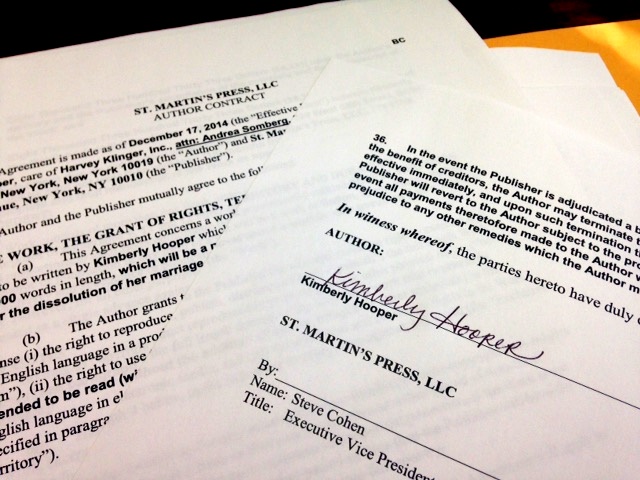When my agent told me we made a deal with St. Martin’s Press, I thought the contract would be signed the next day and I’d be on my way. Um, no. Turns out the wheels turn kind of slowly. I got my book deal in early November and I just signed the contract this month. In that waiting time, I was pretty much assuming that everyone had changed their mind. Even now that I’ve signed it, I still don’t believe it’s real.

I had no idea what a contract involved, so I assume many fellow writers don’t either. First of all, the thing is 30 pages. I realized as I read it that *this* is why writers really, really need agents. There is a lot of stuff in there that is confusing lawyer speak. This is an agent’s everyday life though. Agents know what’s standard, what’s negotiable, what’s fair. I would not have felt comfortable signing it without my agent’s input.
Here is what a publishing contract includes:
- Description of the work in question (duh) and granting of author rights
- The amount of the advance and how it will be paid (I’ll have to do another post about this)
- Royalty percentages (for hardcover editions, paperback editions, mass-market paperback editions, electronic editions, audio editions, etc, etc, etc)
- Additional and subsidiary rights (first serial rights, second serial rights, selection rights, translation rights, etc, etc, etc—I had to ask my agent what all this meant and I’m still fuzzy)
- Licensing information
- Intellectual property ownership declaration—writer owns the copyright, basically
- Rules about “competitive works”—publishing house gets first dibs to things, basically
- The date the final manuscript is due (mine is March 1 and I haven’t received my final edits yet—gahhh!)
- “Will publish by” date—within 18 months of acceptance of the manuscript
- How to submit future works for publication (I’ll have to do another post about this)
- Who the author’s agent is and the agency’s role in the whole shebang
- And a bunch of other stuff about how the publishing house can use your bio and photo, how you get a certain number of copies of the book (and your agent does too), how accounting and payments will work, what happens if publication is discontinued, how the author’s estate comes into play (like if I croak), etc, etc, etc
Like I said, I didn’t really know what most of this meant, or if it was industry standard or what. I had to put trust in my agent, 100%. This is why authors should seek out an agent who has been around the block a few (hundred) times and, preferably, is part of a bigger agency that has experience and respect. There were a few rounds of back-and-forth between my agent and the publishing house to finalize some details, most of which were kind of over my head. In the end, the contract is signed and I’m very excited to start the next part of this journey.
Holy Kamoly! I had no idea!!!
Right?! It’s crazy!
This is so exciting! I can’t wait to buy a copy!
Yay!! Maybe I can do a reading at Vroman’s 🙂
A lot of stuff. Like signing the deed for a house. Good luck. I hope to someday have one of those to sign myself.
Keep at it and I bet you will!
Lawyer speak. Ha, I love that. But really, I’d love to see you post more of what really goes on once you have an agent and a contract. I’m probably just a sucker for details, but it’s always awesome to get the point of view of an upcoming author. Congrats by the way!
Thanks! I’m going to do a “Publishing Journey” series with insights along the way! Stay tuned 🙂